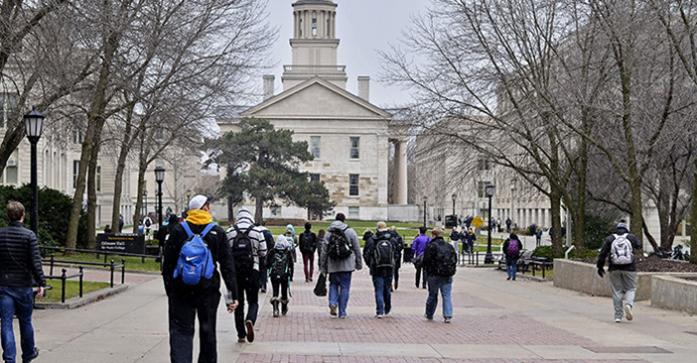Business leaders and M.B.A. students gathered for the annual Sustainability Summit 2017 to discuss how companies are integrating sustainable strategies.
By Isabella Senno
Organic honey, handmade blankets, and tiny houses have more in common than meets the eye.
According to a recent study by the Pew Research Institute, over the past decade, Americans have been trying to live cleaner by buying greener, as shown by soaring growth across the board in industries from locally sourced produce, fair trade products, and eco-friendly housing.
In order to help M.B.A. students keep up with these shifts in consumer interest, the Net Impact Sustainability Summit 2017 was held on Feb. 3 in Old Brick, 26 E. Market St.
During the annual summit, business experts from a broad range of industries spoke with graduate students from the Tippie College of Business about how they could integrate a variety of sustainable practices into their business methods and models.
“I would like for our future business environment as well as the natural environment to be in a better position going forward,” said Casey Spoden, the president of the graduate chapter of Net Impact at Tippie. “It’s important for students to hear because a lot of time we’re focused on the bottom line, and while that’s important because we need money to run a business, it’s not the only thing.”
Speakers responded to questions over the course of four hours, emphasizing the necessity for businesses to be sustainable in today’s changing market and noting that new graduates needed to be prepared to listen to their demographics in order to succeed.
“Consumer trends for sustainability have only intensified; customers expect companies and employees to live up to their goals and expectations,” said Jesse Singerman, the operator of private investment fund Prairie Ventures and one of the panelists. “The most important thing you do is start understanding what happens because you’re doing business. [Sustainability] is not something you hang onto the business, but something that becomes who you are.”
Panelists also discussed the roadblocks that businesses could experience on the path to more sustainable practices, advising students to remain tenacious.
“Not everything is solvable right within the business; not everything is going to be within the business’ direct control, but the advocacy part is,” said Nancy Bird, the executive director of the Iowa City Downtown District and a panelist. “There’s definitely obstacles, but that doesn’t mean the work can’t be done.”
Students were also encouraged to consider sustainability not just as environmentally healthy but also better for the long-term outlook of their companies.
“Sustainability in business, you can especially think of in a broader way. There are companies whose main goal is not to be a sustainable company necessarily, like a bank, but sustainability can also be integrated into businesses in terms of a social responsibility aspect,” Spoden said. “You have to have sustainable business practices, and you have to be fair and embody the ethics of the customers you’re serving in order for your business to be sustainable in terms of longevity.”
It’s a delicate process to strike a balance between the responsibility that businesses have to their customers and community to be environmentally conscious, while at the same time keeping themselves in the black, but it can be done.
“The easiest way to say it is that we live a triple bottom line — people, profit, planet,” Singerman said.







